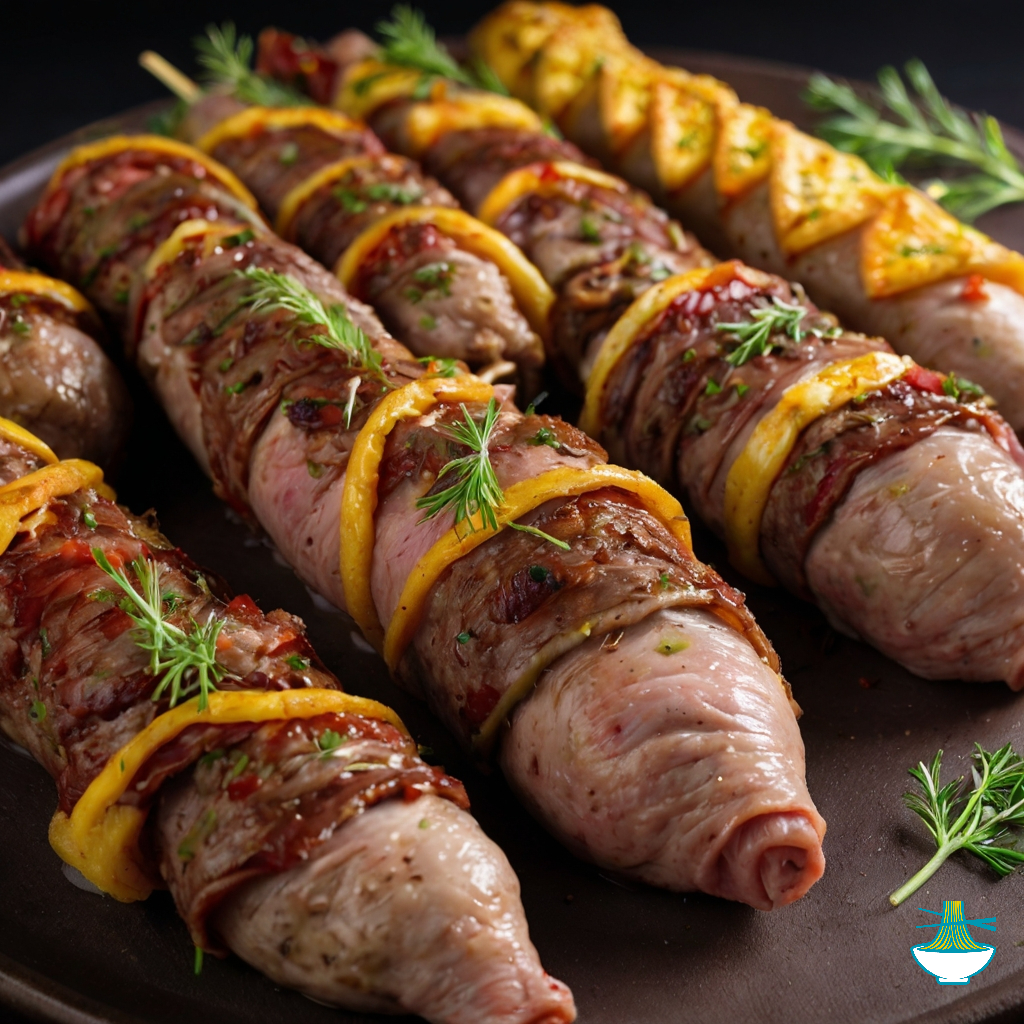"Kruchenyky" are a Ukrainian delicacy consisting of thinly sliced pork or beef rolled around a savory filling, typically mushrooms or cheese, before being cooked. This dish has a long history in Ukrainian cuisine, dating back centuries, and remains a beloved favorite due to its delicious flavors and versatility. Traditionally served on special occasions, "Kruchenyky" reflect the rich culinary heritage of Ukraine and continue to be enjoyed by families across the country and beyond.
Ingredients:
- Thinly sliced pork or beef
- Mushrooms (sliced)
- Cheese (sliced or grated)
- Salt
- Pepper
- Oil (for frying)
Method:
1. Season the meat slices with salt and pepper.
2. Place a slice of cheese and a few slices of mushrooms on each meat slice.
3. Roll the meat around the filling tightly.
4. Secure the rolls with toothpicks or kitchen twine if needed.
5. Heat oil in a pan over medium heat.
6. Place the rolls in the pan and cook until browned on all sides and cooked through, about 10-12 minutes.
7. Remove the toothpicks or twine before serving.
8. Serve hot and enjoy your delicious Kruchenyky!
Nutrition Value:
1. Thinly sliced pork or beef:
- Calories: Approximately 250-300 calories per 100 grams (depending on the cut and fat content).
- Protein: High in protein, providing around 25-30 grams per 100 grams.
- Fat: Contains varying amounts of fat, typically 15-25 grams per 100 grams.
- Sodium: Can contain some sodium, typically around 50-70 milligrams per 100 grams.
- Cholesterol: Contains cholesterol, approximately 60-90 milligrams per 100 grams.
- Vitamins and Minerals: Good source of B vitamins (especially B12), zinc, and iron.
- Nutritional Benefits: Provides essential proteins and nutrients for muscle growth and repair, as well as iron for healthy blood.
2. Mushrooms (sliced):
- Calories: Low in calories, approximately 15-20 calories per 100 grams.
- Carbohydrates: Contains around 2-3 grams of carbohydrates per 100 grams.
- Protein: Provides around 1-2 grams of protein per 100 grams.
- Fat: Virtually fat-free.
- Sodium: Low in sodium, typically less than 5 milligrams per 100 grams.
- Vitamins and Minerals: Rich in vitamins B, C, and D, as well as minerals like potassium, selenium, and copper.
- Nutritional Benefits: Mushrooms are low in calories and fat but rich in vitamins and minerals, making them a healthy addition to the diet.
3. Cheese (sliced or grated):
- Calories: Calorie content varies depending on the type of cheese, but it ranges from 300-400 calories per 100 grams.
- Carbohydrates: Contains some carbohydrates, typically around 1-2 grams per 100 grams.
- Protein: Good source of protein, providing around 20-30 grams per 100 grams.
- Fat: High in fat, with approximately 20-30 grams of fat per 100 grams.
- Sodium: Can be high in sodium, ranging from 400-800 milligrams per 100 grams.
- Cholesterol: Contains cholesterol, approximately 80-100 milligrams per 100 grams.
- Vitamins and Minerals: Good source of calcium, phosphorus, and vitamin A.
- Nutritional Benefits: Cheese is a rich source of calcium and protein, which are essential for bone health and muscle growth.
4. Salt:
- Sodium: Salt is composed of sodium and chloride. Approximately 40% of salt is sodium.
- Nutritional Benefits: Sodium is essential for maintaining fluid balance in the body and nerve function, but excessive consumption can lead to high blood pressure and other health problems. It should be consumed in moderation.
5. Pepper:
- Calories: Negligible, as it is typically used in small amounts.
- Nutritional Benefits: Black pepper is rich in antioxidants and has anti-inflammatory properties. It also aids in digestion.
6. Oil (for frying):
- Calories: High in calories, providing around 800 calories per 100 grams.
- Fat: Contains predominantly fat, approximately 100 grams per 100 grams.
- Nutritional Benefits: Oil provides essential fatty acids and fat-soluble vitamins. However, it should be used in moderation due to its high calorie and fat content. Opt for healthier oils like olive oil or canola oil for frying.


Comments